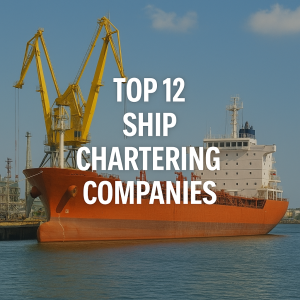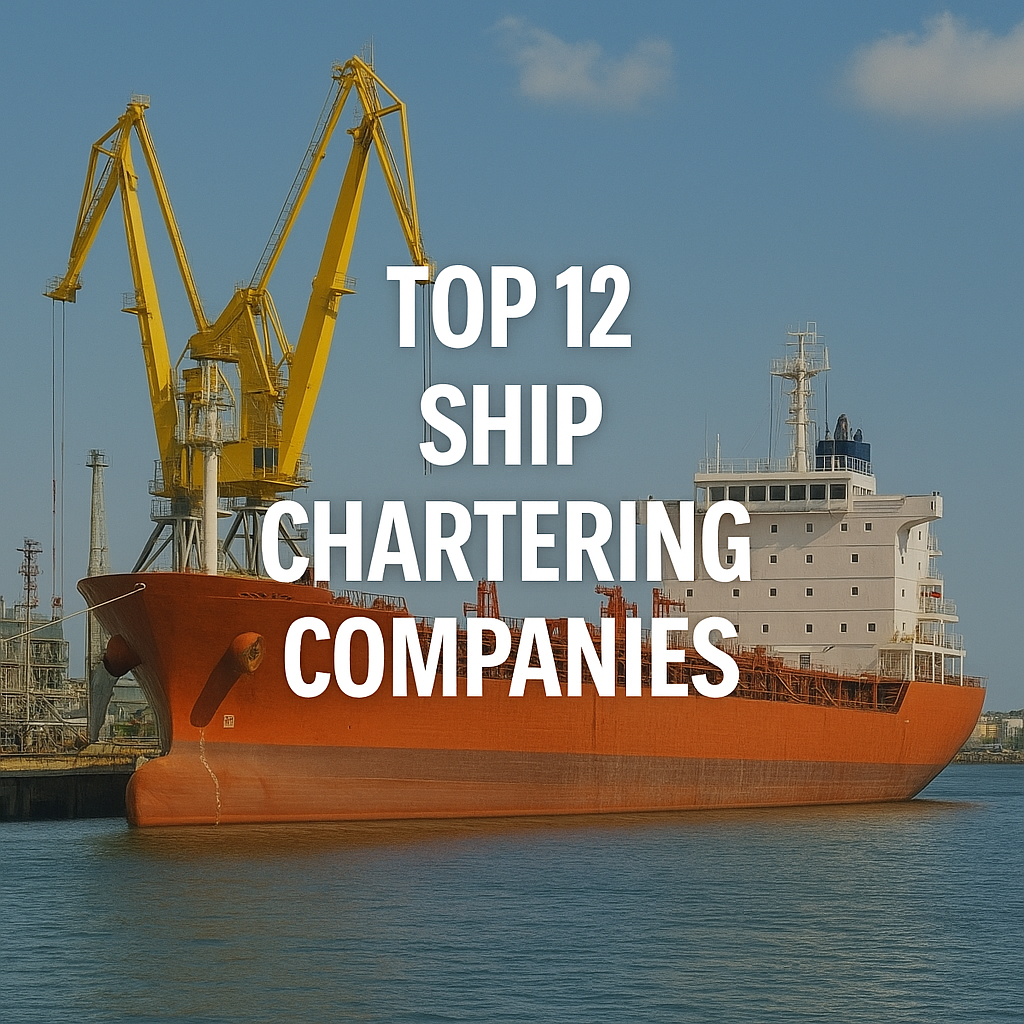Explore the top 12 ship chartering companies shaping global trade and freight logistics. Learn how these giants influence shipping rates, fleet utilization, and maritime strategy in this expert guide.

Why Ship Chartering Matters in Modern Maritime Operations
In the global shipping industry, ship chartering serves as a dynamic bridge between cargo owners and vessel operators. Chartering allows companies to lease ships without owning them, optimizing fleet flexibility and cost-efficiency. In an industry where demand can fluctuate drastically due to geopolitics, fuel costs, or economic shifts, the ability to scale vessel access is vital.
According to BIMCO and Clarksons Research, over 60% of seaborne cargo by volume is moved under some form of charter agreement—be it time charter, voyage charter, or bareboat charter. As the maritime world transitions toward digital platforms and sustainability mandates, chartering companies play an even more critical role in ensuring optimized utilization, carbon reporting, and real-time freight visibility.
1. Clarksons Platou (UK)
- Role: World’s largest shipbroker
- Specialties: Dry bulk, tankers, LNG, offshore vessels
- Added Value: Freight derivatives, emissions advisory, data analytics
- Global Footprint: 50+ offices worldwide
Website: https://www.clarksons.com
2. Braemar Shipping Services (UK)
- Core Areas: Chartering, S&P, valuations, technical consultancy
- Market Focus: Tankers, gas, and dry cargo
- Expansion: Significant investments in digital chartering tools
- Compliance Role: Carbon Intensity Indicator (CII) compliance guidance
Website: https://www.braemar.com
3. Howe Robinson Partners (UK/Singapore)
- Strengths: Container, LPG, and dry bulk chartering
- Edge: Strong Asia-Europe trade lane expertise
- Technology: Proprietary platforms for freight rate modeling
Website: https://www.howerobinson.com
4. Maersk Broker (Denmark)
- Affiliation: Independent from Maersk Line but shares brand legacy
- Coverage: All vessel classes including offshore and renewables
- Innovations: Green charter solutions, digital ship matching
Website: https://www.maerskbroker.com
5. Fearnleys AS (Norway)
- Established: 1869
- Sectors: Tankers, dry bulk, gas, offshore
- Digital Expansion: Integrated analytics with Astrup Fearnley ecosystem
- Key Regions: North Atlantic, Arctic, and LNG corridors
Website: https://www.fearnleys.com
6. SSY – Simpson Spence Young (UK)
- Ranking: Among the top three shipbrokers globally
- Notable Segments: LNG, coal, iron ore, containers
- Climate Adaptation: Decarbonization advisory, EU ETS integration tools
Website: https://www.ssyonline.com
7. Ifchor Galbraiths (Switzerland/UK)
- Merger: Formed by 2022 merger between Galbraiths and IFCHOR
- Focus: Dry bulk, wet, LNG
- Digital Edge: Route analytics, performance tracking
- Client Base: Charterers, owners, financial institutions
Website: https://www.ifchorgalbraiths.com
8. Poten & Partners (USA)
- Reputation: Leading U.S.-based chartering and LNG brokerage
- Core Business: Tankers, LNG, shipping economics consultancy
- Government Ties: Advises U.S. and international energy agencies
Website: https://www.poten.com
9. Lorentzen & Stemoco (Norway)
- Services: Chartering, S&P, project development
- Market: Global presence, strong in tanker and clean energy segments
- Trends: Charter structures optimized for emissions transparency
Website: https://www.lorstem.no
10. McQuilling Partners (USA)
- Sectors: Tankers, gas, project cargo
- Global Reach: Offices in the Americas, Middle East, Asia
- Value-Add: Freight rate forecasting, digital ship chartering dashboards
Website: https://www.mcquilling.com
11. Intermodal Shipbrokers (Greece)
- Established: 1984
- Chartering Focus: Dry and wet
- Other Services: Ship sale & purchase, research, finance consultancy
Website: https://www.intermodal.gr
12. BRS Group (France)
- Footprint: Global broker across tanker, LNG, dry bulk, containers
- Data & Research: Produces widely respected maritime indices
- Sustainability Tools: Smart routing and voyage optimization APIs
Website: https://www.brsbrokers.com
Real-World Applications and Industry Influence
Clarksons: More Than Just Chartering
Beyond ship chartering, Clarksons has invested heavily in maritime intelligence. Its SeaNet and GreenTransition services offer carbon monitoring, making Clarksons a key actor in the ESG ecosystem.
BRS Group: Broker and Think Tank
BRS isn’t just a broker—it’s a data powerhouse. Its annual reports and real-time freight indices help global players benchmark freight and plan charter strategies.
Poten & Partners: LNG Advisory in Action
Poten’s LNG chartering desk has been instrumental in brokering long-term charters tied to U.S. LNG export terminals, connecting North American energy to Europe and Asia.
FAQs
1. What is the role of a ship chartering company? Chartering companies act as intermediaries, negotiating the lease of ships between owners and charterers under different contract types—voyage, time, or bareboat.
2. How do shipbrokers make money? They earn commissions based on the value of the contract, typically ranging from 1.25% to 2.5% of freight revenue or time charter hire.
3. What are time vs. voyage charters? Time charters lease a vessel for a specific period. Voyage charters cover a single trip or cargo transport.
4. How is digitalization changing chartering? Digital tools like AI routing, freight forecasting, and emissions calculators enable more efficient, transparent, and compliant charter operations.
5. Do chartering companies own ships? Generally, no. However, some may hold stakes in ship-owning entities or offer ship management services.
6. What’s the link between chartering and environmental regulation? New charter clauses consider carbon intensity, EEXI and CII ratings, and emissions caps, especially for EU ETS compliance.
7. How can students enter shipbroking and chartering careers? Degrees in maritime logistics, internships at brokerages, and certifications from institutes like the Institute of Chartered Shipbrokers (ICS) are recommended paths.
Conclusion
Chartering companies sit at the crossroads of global trade, maritime finance, and sustainability. The top 12 companies highlighted in this guide don’t just match cargo with ships—they optimize entire supply chains, advise on emissions strategy, and shape freight markets.
From legacy brokers like Clarksons to data-driven leaders like BRS and Poten, these firms are vital to the efficient functioning and forward momentum of global shipping.
Call to Action: For students, analysts, and maritime professionals, understanding the strategies and services of top chartering firms is key. Follow industry insights via broker websites, trade platforms like BIMCO, and global charter rate indices to stay ahead.
References
- BIMCO. (2023). Chartering Practices and Market Trends. https://www.bimco.org
- Clarksons Research. (2024). Chartering Market Review. https://www.clarksons.net
- Lloyd’s List Intelligence. (2024). Global Shipbroker Rankings. https://lloydslist.maritimeintelligence.informa.com
- Institute of Chartered Shipbrokers. (2024). Education and Certification Pathways. https://www.ics.org.uk
- Poten & Partners. (2024). LNG Chartering and Consultancy Insights. https://www.poten.com
- BRS Group. (2023). Annual Shipping Review. https://www.brsbrokers.com

